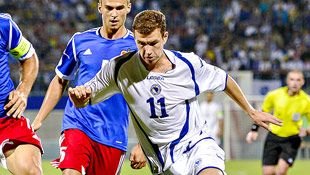Qualification from the European section of World Cup 2014 qualifying is a fairly predictable process -- the big boys will advance easily, and many groups have an obvious second favourite, too.
But there is a chance for some different names to make the cut -- some of which haven't qualified for a major international for years. Here are three nations that have been in the wilderness for a decade or more, but could make it to Brazil in summer 2014.

Belgium haven't qualified for a major international since the 2002 World Cup, when they performed admirably in a second-round defeat to eventual champions Brazil, losing 2-0. With such a dearth of major international fixtures since, Belgians are entitled to still feel aggrieved that captain Marc Wilmots' excellent first-half header in that fixture was disallowed for a minimal push -- they tested Brazil more than any team in the tournament.
After an unsuccessful career in the complex world of Belgian politics, Wilmots has returned to the Belgian national side as coach, and has inherited one of the most exciting groups of players in world football. Portugal boasted the golden generation of the 1990s, England supposedly had that luxury in the 2000s, and now the 2010s is set for Belgian dominance -- although Wilmots will be keenly aware that neither Portugal nor England ever turned the hype into international success.
The Belgian side reads like a Who's Who of current Premier League favourites. At the back there's Vincent Kompany, Thomas Vermaelen and Jan Vertonghen, in midfield Moussa Dembele and Marouane Fellaini, then Eden Hazard, Kevin Mirallas and Romelu Lukaku going forward. Add Atletico Madrid's on-loan Chelsea goalkeeper Thibaut Courtois, Porto's Steven Defour and new Zenit signing Axel Witsel, signed for a remarkable 40 million euros last week, and it's a hugely impressive squad.
Yet so far there are few signs the side is jelling. Last month's friendly victory over Holland was encouraging, but Friday's 2-0 win over 10-man Wales illustrated the same problems Georges Leekens encountered in World Cup qualifying. Belgium have great ball players in midfield and plenty of creators, but lack a reliable poacher -- none of the strikers have scored more than five international goals. Lukaku remains a prospect rather than a fearsome striker, Mirallas is too based around pace and is more dangerous coming from a wide position, so new Aston Villa striker Christian Benteke might be given a chance tonight against Croatia, which will be a great test of Belgium's current level of ability.
A second issue is the lack of quality full backs, which means centre backs like Vertonghen and midfielder Guillaume Gillet are played out of position. This might be a greater problem under Wilmots, who wants a fluid, interchangeable front four in a 4-2-3-1, than under Leekens, who wanted constant width in a 4-3-3.
That said, Belgium are still developing -- and even if they don't qualify for Brazil 2014, this talented generation should be in the prime of their careers for Russia in 2018.

Bosnia has only been an independent footballing nation since 1995, and therefore the team's inability to qualify for a major international tournament shouldn't come as much of a surprise. But then, we shouldn't really be talking about them in these terms -- for both World Cup 2010 and Euro 2012, Bosnia were highly impressive throughout the group stage of qualification, finished second place and went into a playoff -- only to be drawn against Portugal both times, the toughest opponent they could have faced. Bosnia were a better side than some that did qualify for Euro 2012.
Although coach Safet Susic has remained in position, he looks set to make some significant changes from the side that fell at the final hurdle last time. Imposing young centre back Toni Sunjic, energetic full back Avdija Vrsajevic and versatile Ognjen Vranjes didn't feature at all during qualification for Euro 2012, but started alongside veteran Emir Spahic in Bosnia's back four for the 8-1 thrashing of Liechtenstein on Friday night.
Both strikers -- Edin Dzeko and Vedad Ibisevic -- recorded hat tricks in that match, and with an extremely creative midfield featuring Zvjezdan Misimovic, Dzeko's partner in crime at Wolfsburg, and enigmatic Roma playmaker Miralem Pjanic, more goals will be on the way. Tonight's game against Latvia should be another chance to run up a convincing victory.
The biggest test will be next month, when Bosnia will travel to the Karaiskakis Stadium in Athens for a crucial match against Greece, the strongest team in the group. Susic is not a defensive manager, but a point against Bosnia's major rivals for the group would be a terrific result -- judging by Greece's nervous 2-1 win against Latvia, Bosnia are more likely to demolish the minnows in the group.
Slovakia are the only other serious contenders in the group. For once, Bosnia can be thankful for a lucky draw, and there can be no excuses if they fail to finish top and are forced into yet another tense playoff.
Hungary
Sixty years ago they were the greatest football side in the world, and having not qualified for a major tournament since 1986, the mighty Magyars of Ferenc Puskas' generation are still discussed more frequently than the current generation.
But Hungary might be able to sneak into a playoff this time. For the second qualification tournament they've been drawn against Holland, who defeated them home and away last year, but the second spot in the group is up for grabs. Turkey are the favourites but have stuttered over the past four years and seem unable to make the most of their considerable talents, while Romania lack anything like the stars of the 1990s.
In fairness, Sandor Egervari doesn't have a team full of superstars either. But he does possess some genuine talents going forward -- captain Zoltan Gera has started the season impressively for West Brom, while on the left Balazs Dzsudzsak would have been snapped up by a major European side had he not opted for the riches of the Russian Premier League. Up front there's a choice between two players who have struggled for regular first-team football over the past couple of seasons, Krisztian Nemeth and Tamas Priskin, plus the hard-working Mainz striker Adam Szalai, now back after suffering a cruciate ligament injury last year, and the greatest talent up front. When you complete the attacking quartet with Stuttgart playmaker Tamas Hajnal, it looks very promising.
The problems are at the back -- none of the defenders play regularly in major European leagues, although in this area of the pitch individual quality can be compensated for with organisation and discipline. Perhaps the key to progress is Egervari working out what type of coach he wants to be -- he was previously in charge of Hungary's youth side, and announced his intention to build a side around the generation that reached the semifinals of the U20 World Cup in 2009.
Relatively few of those players have pushed on, however, and now Egervari seems more of a tactician, changing his starting shape to surprise the opposition. Is he building a cohesive group or working from game to game? Tonight's clash with Holland will be interesting, but Hungary are playing for second place behind their opponents.
source: http://soccernet.espn.go.com/blog/_/name/tacticsandanalysis/id/130?cc=4716
Tiada ulasan:
Catat Ulasan